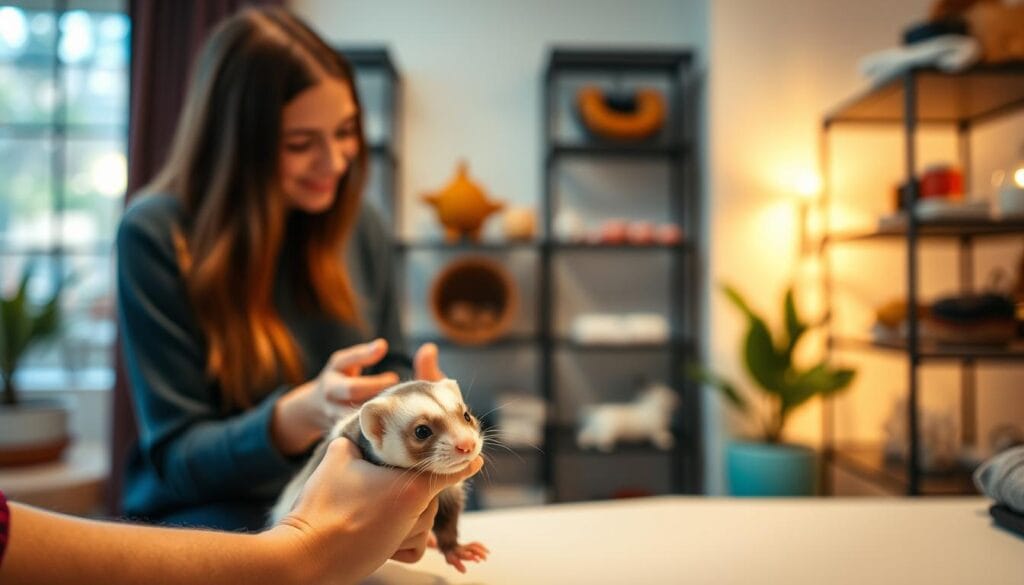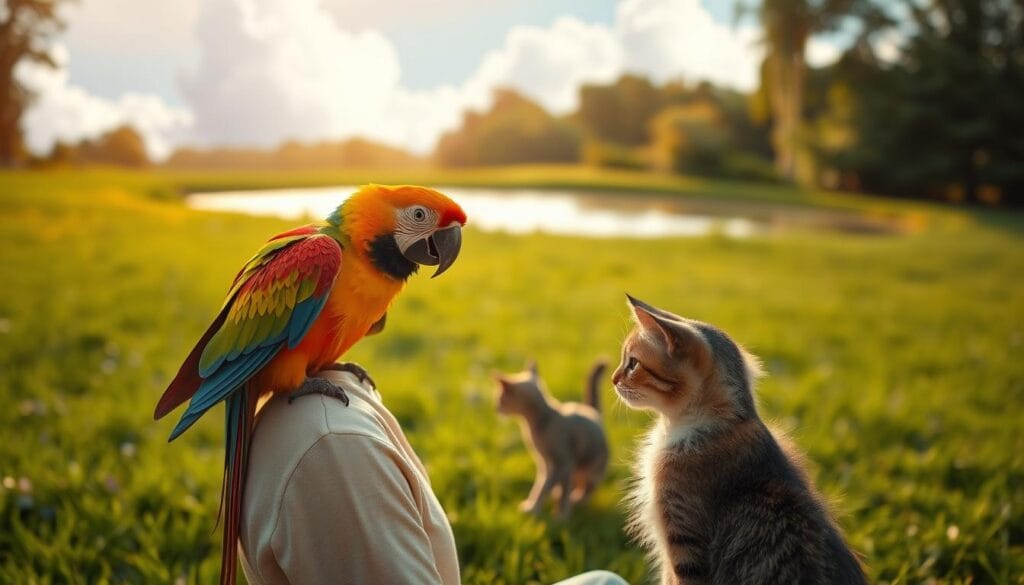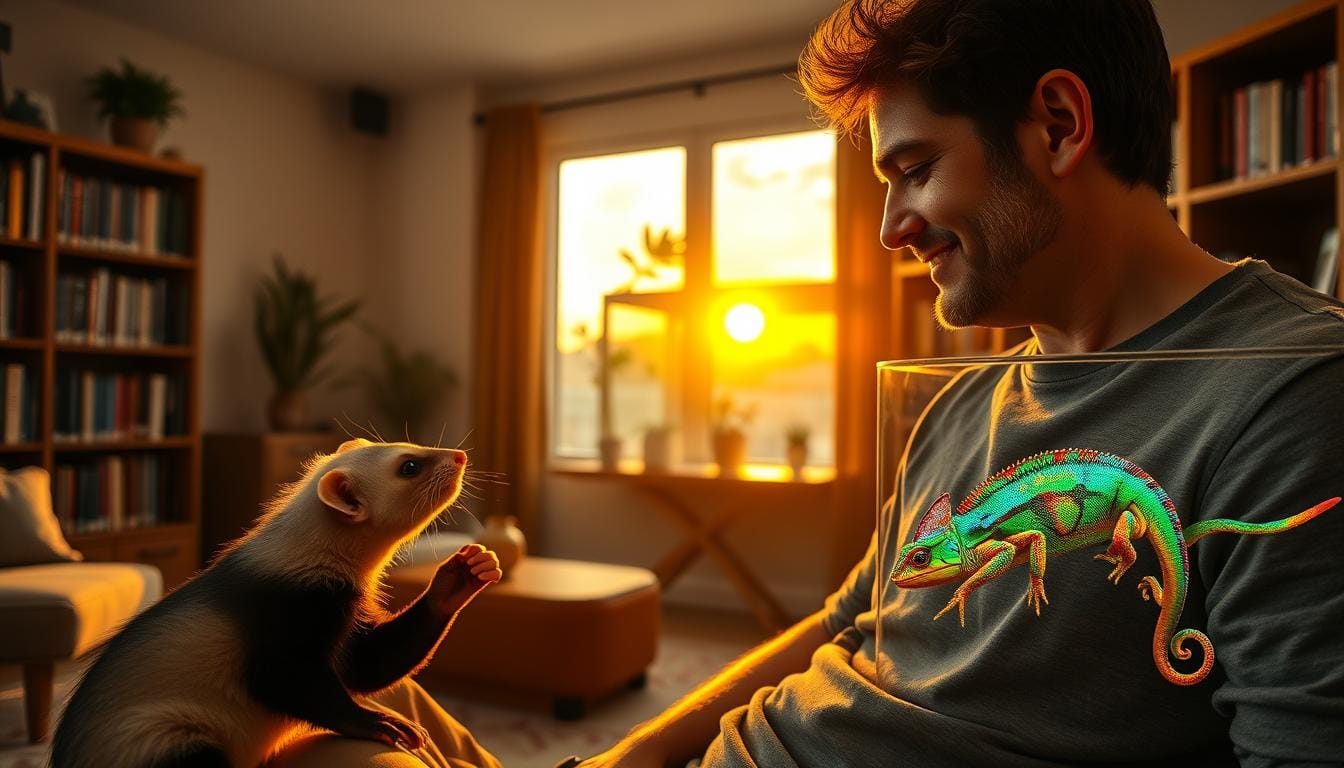As an exotic animal owner, you know how vital a caring home is for your special pet. Socialization is crucial for your pet’s emotional and behavioral health. Learning exotic pet socialization techniques can make it happy and strengthen your bond.
With the right steps, your exotic pet can feel at ease and confident. This guide will show you why socialization matters and how to make a safe space for your pet.
Table of Contents
Understanding the Importance of Socialization
As a pet owner, knowing about socialization is key to your exotic pet’s happiness. It’s not just a process; it’s vital for your pet’s behavior and emotional health.
What is Socialization for Pets?
Socialization means introducing pets to different places, people, and animals. This helps them feel confident and calm in new settings. Effective socialization is key to developing a well-adjusted pet.
Benefits of Socializing Exotic Pets
Socializing your exotic pet brings many benefits, including:
- Reducing stress and anxiety in new or unfamiliar situations
- Preventing behavioral problems through early exposure to various stimuli
- Enhancing your pet’s ability to interact calmly with people and other animals
- Fostering a stronger bond between you and your pet through positive interactions
By understanding and using effective socialization techniques, you can greatly improve your exotic pet’s life. It’s a journey that requires patience, consistency, and positive reinforcement.
Types of Exotic Pets and Their Social Needs
Different exotic pets need different ways to socialize. Whether you’re new or experienced with exotic animals, knowing their social needs is key. It helps build a strong, healthy bond with your pet.
Exotic pets include birds, reptiles, small mammals, and more. Each group has its own needs and ways to socialize. For example, birds love to interact, while reptiles need a safe space.
Common Exotic Pets to Consider
Popular exotic pets are parrots, bearded dragons, hedgehogs, and sugar gliders. Parrots are smart and can talk, needing lots of interaction and brain games. Bearded dragons, though, are calm and can get used to being handled.
| Pet Type | Social Needs | Handling Requirements |
|---|---|---|
| Parrots | High interaction, mental stimulation | Frequent handling, training |
| Bearded Dragons | Regular handling, gentle interaction | Moderate handling, basking areas |
| Hedgehogs | Initial acclimation, gentle handling | Careful handling, avoiding sudden movements |
Unique Socialization Requirements by Species
Knowing what your exotic pet needs is crucial for socializing them right. For instance, sugar gliders are active at night and love company. They do best in pairs or groups, needing lots of attention.
By understanding your pet’s needs, you can socialize them effectively. Whether it’s through play, changing their environment, or training, the right method matters. It affects their happiness and your bond with them.
Gradual Introduction Techniques
A gradual introduction is key in training exotic pets for socialization. It helps them get used to new places, people, and animals. This way, they become more confident and calm in new situations.
Setting Up a Safe Environment
Before you start socializing your pet, make sure they have a safe place. This spot should be comfortable and familiar, with no stressors.
Keep your pet’s home clean and add hiding spots and visual barriers. This makes them feel safe and lowers stress during socialization.
Controlled Interactions with Family Members
It’s important to have controlled interactions with family. Start by letting your pet get used to family members from a distance.
Then, slowly let family members give treats or play with your pet. This makes them see family as positive.
Using Positive Reinforcement
Positive reinforcement is a key tool in socializing exotic pets. It helps build trust and strengthens your bond. By rewarding good behavior, you encourage your pet to repeat it. This leads to a more sociable and well-adjusted animal.

Rewards in the Socialization Process
Rewards are vital in positive reinforcement. When your exotic pet shows calm or friendly behavior, reward them right away. Use treats, praise, or play, based on what motivates your pet. For example, if you’re training an exotic cat, a favorite toy or treat works well.
“Positive reinforcement in animal training is more than rewarding good behavior,” says a top animal behaviorist. “It’s about building a relationship based on trust and understanding.” This method helps in socialization and strengthens your bond with your pet.
Tips for Effective Training
To use positive reinforcement well, first figure out what rewards your pet likes best. Keep training sessions short and positive. Be patient, as building trust takes time. Here are more tips:
- Use different rewards to keep training interesting.
- Avoid punishing or scolding your pet, as it can create negative associations.
- Slowly add more complex behaviors to reward.
By following these tips and staying positive and patient, you can socialize your exotic pet effectively. This improves their social skills and strengthens your bond. It makes for a happier, healthier pet.
Recognizing Signs of Stress and Comfort
Knowing when your exotic pet is stressed or comfortable is key to their happiness. When introducing them to new places, watch their emotional signs closely.
Body Language Signals in Exotic Pets
Exotic pets mainly talk through body language. Understanding these signals helps you see if they’re stressed or at ease. A calm pet might show open postures, while a stressed one might seem defensive.
Look out for these body language signs:
- Ears laid back or held in an unusual position
- Tail twitching or held stiffly
- Whisker position and facial tension
- Posture, such as crouching or standing tall
Animal behaviorists say, “Noticing these small signs helps you know how your pet feels. This knowledge can greatly reduce stress and increase comfort.”
| Body Language Signal | Possible Interpretation |
|---|---|
| Ears back | Fear or submission |
| Tense posture | Stress or anxiety |
| Relaxed posture | Comfort and trust |
When to Intervene for Your Pet’s Well-Being
Acting quickly can stop stress from getting worse. If your pet shows signs of stress often, find out why and fix it.
“Early intervention can make a significant difference in your pet’s ability to cope with stress.”
Here are some steps to help:
- Change their environment to lessen stress
- Give them more support and reassurance
- Get advice from a vet or animal behaviorist
By paying attention to your exotic pet’s needs and acting early, you can make their life better and less stressful.
Socialization with Other Animals
When it comes to socializing exotic pets with other animals, it’s key to think about each pet’s unique needs and personality. This careful thought ensures a peaceful home for everyone.
Best Practices for Introducing New Pets
Bringing a new pet into your home needs a slow and careful approach. Begin by keeping the pets apart and letting them get used to each other’s smells and sounds. Swap their bedding or toys to help them get familiar.
When they seem okay with each other’s presence, it’s time for a supervised meeting. For more tips on training and socializing exotic pets, check out Animal Care Unlimited.
Watch their body language closely during their first meeting. If you see signs of aggression or fear, like hissing or hiding, separate them right away. Then, start the process again from the beginning.

Supervision During Multi-Pet Interactions
Always watch when your exotic pet meets other animals in the house. Be there during their first meeting to avoid any fights. As they get more comfortable, you can let them play together more without watching.
But, still check on them now and then to make sure they’re getting along. For homes with many exotic pets, having a routine is helpful. This includes time alone with each pet and supervised playtime together. For tips on managing multiple pets, visit Exotic Pet Haven.
By following these steps and paying attention to your pets’ needs, you can make a happy and social home for your exotic pet.
Enrichment Activities to Foster Social Skills
To help your exotic pet thrive, adding enrichment activities is key. These activities are crucial for social skills. They offer a variety of experiences that encourage interaction and help develop good behavior.
Indoor Activities to Encourage Interaction
Indoor activities are great for socializing your exotic pet, even when it’s bad outside. You can make their space more interesting by changing things around, introducing new toys, or even setting up a supervised playdate with other pets.
- Change toys and objects often to keep your pet curious.
- Make a foraging area that feels like their natural habitat.
- Use puzzle toys filled with treats to challenge and teach problem-solving.
Outdoor Adventures for Bonding and Learning
Outdoor adventures are great for bonding and learning with your exotic pet. Taking them on supervised outings can make them more confident and calm in new places. Make sure the outdoor area is safe and secure to avoid risks.
Some outdoor activities to try include:
- Supervised walks on a harness and leash, if your pet can wear one.
- Outdoor enclosures or secure areas for exploration and interaction with nature.
- Training sessions that teach outdoor commands and behaviors.
| Activity Type | Indoor/Outdoor | Benefits |
|---|---|---|
| Toy Rotation | Indoor | Reduces boredom, encourages exploration |
| Foraging Games | Indoor | Mimics natural behavior, stimulates mental activity |
| Supervised Walks | Outdoor | Enhances confidence, provides exercise |
| Outdoor Enclosures | Outdoor | Offers a natural environment, promotes natural behavior |
By mixing indoor and outdoor activities, you can greatly improve your exotic pet’s social skills and happiness. Remember, the key is to be consistent, patient, and positive.
The Role of Professional Help
Many exotic pet owners can socialize their pets well on their own. But, some may need professional help to tackle specific challenges. Socializing an exotic pet is complex. It involves understanding the pet’s behavior and providing the right environment. Sometimes, expert advice is necessary.
When to Consult a Veterinarian or Trainer
Knowing when your exotic pet needs more than your care is key. Look out for signs like aggression, fear, or stress. If you see these, it’s time to talk to a professional.
- Aggression towards people or other pets
- Fear or stress responses to normal environments or interactions
- Difficulty in adapting to new environments or situations
Getting advice from a vet or trainer can help a lot. They can give you specific tips and strategies. They’ll help you figure out why your pet is acting out and teach you positive reinforcement techniques.
Finding an Expert in Exotic Animal Behavior
Finding a pro in exotic animal behavior might seem hard. But, there are steps you can take:
- Ask your vet or local pet groups for recommendations.
- Look for certifications from known organizations in exotic animal behavior.
- Check their experience and what other pet owners say about them.
| Criteria | Description | Importance Level |
|---|---|---|
| Experience with Exotic Pets | They should have a good track record with pets like yours. | High |
| Certifications | They should have certifications from respected animal behavior bodies. | High |
| Client Reviews | Good reviews from other exotic pet owners are a sign of their skill. | Medium |
Getting professional help when needed is crucial. It ensures your exotic pet gets the best care and socialization. This improves their life and strengthens your bond with them.
Maintaining Ongoing Socialization
To keep your exotic pet confident and calm, ongoing socialization is key. As your pet grows, their social needs might change. This means you’ll need to adjust their socialization plan.
Regular Monitoring and Adjustments
Regular check-ins with your pet help spot areas for improvement. This lets you tweak their behavior modification plan as needed. You might change how often you interact or introduce new places and things.
Creating Lifelong Social Habits
Make socialization a part of your daily routine. This helps your exotic pet develop good social habits for life. Activities like handling, training, and exploring different places are all part of this.
Consistent and ongoing socialization is key to effective behavior modification. By sticking with it, you help your pet flourish and deepen your connection with them.

